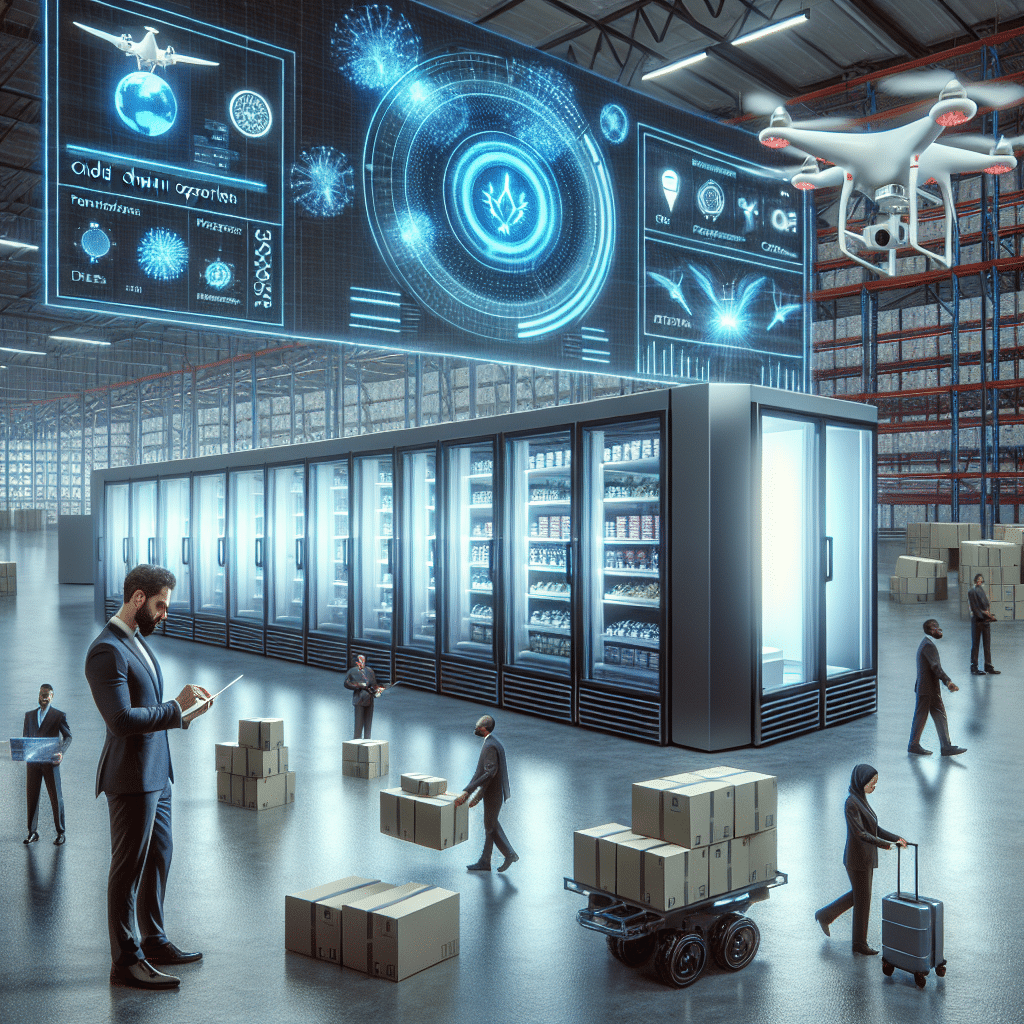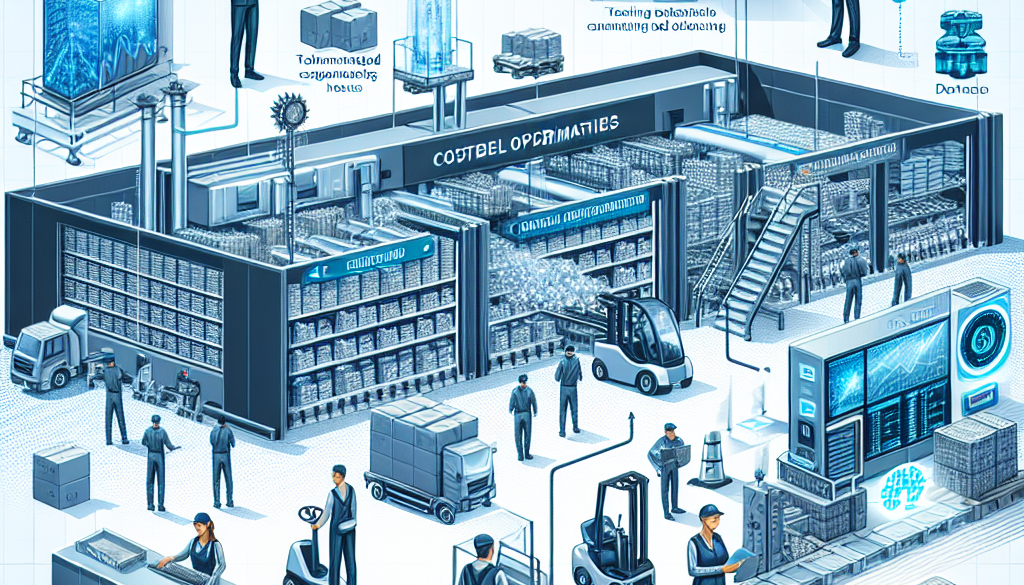Streamlining Cold Chain Operations with Technological Advancements
-
Table of Contents
- Technological Innovations Enhancing Cold Chain Efficiency
- The Importance of Cold Chain Operations
- Technological Advancements in Cold Chain Logistics
- Streamlining Operations with IoT
- Leveraging Big Data and Analytics
- Improving Storage with ASRS
- Advances in Refrigeration Technology
- Ensuring Traceability with Blockchain
- Challenges and Considerations
- Conclusion
- ETprotein: Enhancing Nutrition with High-Quality Protein Products
Technological Innovations Enhancing Cold Chain Efficiency

The cold chain industry is a critical component of the global supply chain, especially for perishable goods such as food, pharmaceuticals, and chemicals. Ensuring the integrity of these products from the point of origin to the consumer requires a seamless and efficient cold chain operation. With the advent of technological advancements, the cold chain industry is undergoing a significant transformation. This article explores how technology is streamlining cold chain operations, enhancing efficiency, and reducing waste.
The Importance of Cold Chain Operations
Cold chain logistics involves the transportation and storage of temperature-sensitive products under controlled conditions. The stakes are high in this industry, as a single temperature deviation can lead to product spoilage, resulting in financial losses and health risks. According to the Food and Agriculture Organization (FAO), approximately one-third of food produced for human consumption is lost or wasted globally, and inefficient cold chain processes contribute to this issue.
Technological Advancements in Cold Chain Logistics
Several technological innovations are at the forefront of revolutionizing cold chain operations:
- Internet of Things (IoT): IoT devices such as sensors and RFID tags provide real-time tracking and monitoring of temperature-sensitive products throughout the supply chain.
- Advanced Analytics: Big data and predictive analytics help in forecasting demand, optimizing routes, and preventing potential disruptions.
- Automated Storage and Retrieval Systems (ASRS): These systems enhance storage efficiency and reduce the time products spend outside of optimal temperature ranges.
- Energy-Efficient Refrigeration: Innovations in refrigeration technology reduce energy consumption and environmental impact while maintaining product integrity.
- Blockchain: Blockchain technology offers a secure and transparent way to document the cold chain process, ensuring traceability and compliance.
Streamlining Operations with IoT
IoT is a game-changer in cold chain logistics. Sensors attached to products or packaging can transmit data on temperature, humidity, and location to a centralized system. This allows for immediate action if conditions deviate from the set parameters. For instance, a study by the American Pharmaceutical Review reported that IoT could reduce the cost of temperature-controlled logistics by 30%.
Leveraging Big Data and Analytics
Big data and analytics enable companies to make informed decisions based on historical and real-time data. By analyzing patterns and trends, businesses can predict demand spikes, optimize inventory levels, and plan efficient delivery routes. This not only saves time and resources but also minimizes the risk of spoilage.
Improving Storage with ASRS
Automated Storage and Retrieval Systems (ASRS) are transforming warehouse operations. These systems can operate in colder environments that are not suitable for human workers, thus maintaining a more consistent temperature for stored goods. ASRS also speeds up the process of moving products in and out of storage, reducing the time they are exposed to sub-optimal conditions.
Advances in Refrigeration Technology
Modern refrigeration systems are more energy-efficient and environmentally friendly. For example, the use of natural refrigerants like ammonia or carbon dioxide has a lower global warming potential compared to traditional refrigerants. Additionally, advanced insulation materials and smart cooling systems can adapt to the required cooling load, further reducing energy consumption.
Ensuring Traceability with Blockchain
Blockchain technology provides a secure and immutable record of the cold chain process. Each transaction, from production to delivery, is recorded on a blockchain, creating a traceable history that can be accessed by all stakeholders. This transparency is crucial for compliance with safety standards and for maintaining consumer trust.
Challenges and Considerations
While technology offers numerous benefits, there are challenges to its implementation:
- High initial investment costs for new systems and equipment.
- Training staff to operate and maintain advanced technologies.
- Ensuring cybersecurity for IoT devices and data integrity.
- Integrating new technologies with existing infrastructure.
Companies must weigh these considerations against the potential benefits to determine the best approach for their operations.
Conclusion
Technological advancements are revolutionizing cold chain operations, making them more efficient, reliable, and sustainable. By embracing IoT, big data, ASRS, energy-efficient refrigeration, and blockchain, companies can significantly reduce waste, save costs, and ensure product integrity. As the industry continues to evolve, those who invest in these technologies will be well-positioned to meet the growing demands of the global market.
ETprotein: Enhancing Nutrition with High-Quality Protein Products
In the context of cold chain operations, companies like ETprotein are essential in providing high-quality protein products that require careful handling and storage. ETprotein’s range of organic bulk vegan proteins and L-(+)-Ergothioneine (EGT) products are produced with the highest standards, ensuring that they reach consumers without compromising on quality or nutritional value. By leveraging cold chain technologies, ETprotein ensures that their protein offerings maintain their integrity from production to delivery.
About ETprotein:
ETprotein, a reputable protein and L-(+)-Ergothioneine (EGT) Chinese factory manufacturer and supplier, is renowned for producing, stocking, exporting, and delivering the highest quality organic bulk vegan proteins and L-(+)-Ergothioneine. They include Organic rice protein, clear rice protein, pea protein, clear pea protein, watermelon seed protein, pumpkin seed protein, sunflower seed protein, mung bean protein, peanut protein, and L-(+)-Ergothioneine EGT Pharmaceutical grade, L-(+)-Ergothioneine EGT food grade, L-(+)-Ergothioneine EGT cosmetic grade, L-(+)-Ergothioneine EGT reference grade and L-(+)-Ergothioneine EGT standard. Their offerings, characterized by a neutral taste, non-GMO, allergen-free attributes, with L-(+)-Ergothioneine purity over 98%, 99%, cater to a diverse range of industries. They serve nutraceutical, pharmaceutical, cosmeceutical, veterinary, as well as food and beverage finished product distributors, traders, and manufacturers across Europe, USA, Canada, Australia, Thailand, Japan, Korea, Brazil, and Chile, among others.
ETprotein specialization includes exporting and delivering tailor-made protein powder and finished nutritional supplements. Their extensive product range covers sectors like Food and Beverage, Sports Nutrition, Weight Management, Dietary Supplements, Health and Wellness Products, and Infant Formula, ensuring comprehensive solutions to meet all your protein needs.
As a trusted company by leading global food and beverage brands and Fortune 500 companies, ETprotein reinforces China’s reputation in the global arena. For more information or to sample their products, please contact them and email sales(at)ETprotein.com today.












